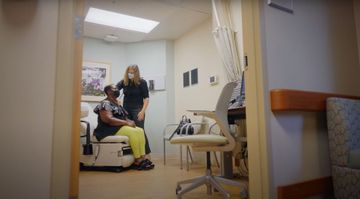A mammogram provides an X-ray of the breast and is the best way to find breast cancer for most adults. If mammography is not available at your local VA Medical Center, ask to be referred to another VA that has mammography, or out to Community Care.
Who should get screened?
Women should have a cancer risk assessment done by their primary care physician at around age 35. For average risk women, the recommendations are the below.
- Women aged 40-74 should get screened every other year starting at age 40 to reduce their risk of dying from breast cancer.
- Women Veterans will have the option to screen annually if they would like to do so.
- Women 75 or older, should talk with their provider before making a decision to be screened. Requests to be screened beyond age 75 will be honored following a discussion about the risks and benefits of screening.
Two tests, the Pap and HPV tests, can help prevent cervical cancer. Pap tests look for cell changes on the cervix that could become cervical cancer. HPV tests look for the human papillomavirus (HPV) that can cause cells on the cervix to become cancerous. Both tests involve a pelvic examination in which a metal or plastic device, called a speculum, is inserted in the vagina to view the cervix. A small brush is then used to collect cells from the cervix.
Who should get screened?
Women should have a cancer risk assessment done by their primary care physician at around age 35. For average risk women, the recommendations are the below.
- Women 21-29 should get a Pap test every 3 years
- Women 30-65 should get screened every 3-5 years depending on the test chosen (Pap test alone is every 3 years; both Pap and HPV testing is every 5 years; and HPV testing alone is every 5 years)
Colorectal cancer screenings check for abnormal growths in the colon or rectum. VA offers the following tests to screen for colon cancer:
- Fecal immunochemical test (FIT)
- Flexible Sigmoidoscopy
- Colonoscopy
FIT screening is done at home to check for blood in stool that you can't see, which can be due to polyps or cancer. If either FIT or flexible sigmoidoscopy detects an abnormality, colonoscopy is necessary. During a colonoscopy, polyps can be removed before they become cancer.
Who should get screened?
Adults aged 45-75 without any known increased risk of colorectal cancer should be screened with one of the following, based on a conversation with their primary care provider:
- Home-based FIT every year
- Flexible sigmoidoscopy every 5 years, or every 10 years with a FIT every year
- Colonoscopy every 10 years
Lung cancer screening uses a low-dose computed tomography (CT) scan to look for signs of lung cancer. This CT scan uses a low dose of x-rays to take detailed pictures of your lungs.
Who should get screened?
You may qualify if you meet these three conditions:
- Are 50-80 years old
- Smoke cigarettes now or quit within the past 15 years
- Smoked cigarettes for at least 20 pack-years*
*A “pack-year” is an estimate of how many cigarettes you have smoked in your lifetime. 20 “pack-years” equals smoking one pack of cigarettes a day for 20 years or two packs of cigarettes a day for 10 years.
What are your next steps for cancer screening?
- Talk to your primary care provider to determine whether you are due for any of the screenings listed here and ask any questions you might have.
- Share this page with a fellow Veteran. You just might save a life.


